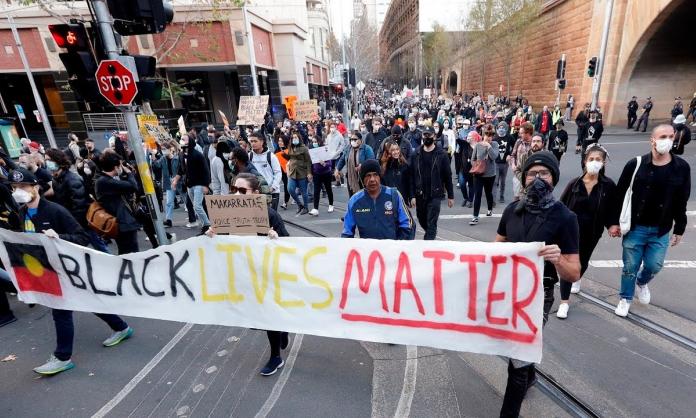Black Lives Matter activists in Sydney will push ahead with a protest on Tuesday 28 July despite opposition from police, the courts and the government. The police succeeded on Sunday in having authorisation for the protest blocked by the NSW Supreme Court. Having already been subject to the ire of prime minister Scott Morrison, who last week described the planned protest as “appalling”, demonstrators will now face a police presence unrestrained by any legal exemptions (such as the basic right to assemble) usually granted to protests.
Protest organisers, led by the family of David Dungay Jr, a 26 year old Dunghutti man killed by prison guards at Long Bay jail in 2015, are not backing down. Dungay’s death has become a rallying point for anger at Indigenous oppression in Australia. His last words – “I can’t breathe” – uttered 12 times as he was pinned to the ground by guards for eating a pack of biscuits, are the same as George Floyd’s. Earlier in the week, the Dungay family stated defiantly that the protesters “cannot stop and will not stop, no matter the outcome in court they will go ahead with these rallies. Until we see change things won’t stop.”
Organisers have lodged an appeal against the court’s decision. However, resistance to the ruling will ultimately be decided on the streets. In mid-June, a similar ruling was overturned minutes before a previous rally began. Tens of thousands had already turned up and the police could do nothing but slink away, a little shamefaced and presumably also annoyed that they couldn’t crack heads like their fellow thugs in Minneapolis, New York and Washington.
Like in the US, the protests aren’t just responding to individual cases of police violence, but the more general brutality of the Australian state and the social order it presides over, which sees Indigenous people (as well as many migrant communities) subject to routine police harassment, as well as high rates of incarceration and poverty.
Predictably, the targets of the protests – the government and the police – are not fond of mass public opposition. Over the last two months, since the resurgence of the Black Lives Matter movement began, the threat of police repression has increasingly come to the fore. On the basis of police “discretion”, public health orders, which restrict public gatherings in NSW to 20 people, have been used to seriously curtail the right to protest.
Police feel confident to flex their muscle against protesters. On multiple occasions in Sydney, hundreds of riot cops have shut down the city centre including the Town Hall railway station in an attempt to hinder protests. Another worrying development has been the repeated presence and threat of deployment by police of “Long Range Acoustic Devices”, a sound weapon used to cause pain and disorientation. Notably, and on multiple occasions, these heroic defenders of public health have neglected to even wear masks.
Even before the Supreme Court ruling was handed down, NSW Police Commissioner Mick Fuller signalled his intent to quash the protest. “Win, lose or draw, we can still take action against people for breaching health orders,” he said during an appearance on Sky News. Earlier in the week, he also went on radio station 2GB to rail against the protest, repeating the lie that the spike in Covid-19 cases in Australia has been caused by public housing residents attending a Black Lives Matter rally in Melbourne.
Health authorities have confirmed that there is no evidence of any link between the protest and Melbourne’s spike in Covid-19 cases. If you’re looking for someone to blame, Victorian Premier Daniel Andrews’ admission that 80 percent of cases were acquired in the workplace is a more useful place to start. If the NSW police were genuine about wanting to limit the spread of Covid-19, they’d be better off fining more of the bosses forcing their workers into unsafe conditions in the service of profits.
As Paul Silva, one of the organisers of the planned Sydney rally remarked: “They’re trying to silence us while using the pandemic as an excuse, but Westfield’s shopping centres, pubs and clubs are still chock-a-block. We put in substantial steps to make sure everyone is safe at these protests and personally I’d say they’re safer than your local pub because they’re conducted outdoors so there’s space for social distancing.”
Earlier in the week, Scott Morrison claimed that allowing the protest to go ahead would be a case of “double standards”. This is pure hypocrisy coming from someone who just last week was pictured enjoying a beer in the crowd at a NRL game.
If we’re going to talk about double standards, we need only point out how the government decided to cancel a parliamentary sitting in early August – apparently out of concern about the health risks involved – while at the same time arguing that for those in NSW and other Australian states it’s fine to open the economy up and return to “business as usual”. Tens of thousands of NSW teachers and students are being forced to attend school five days a week despite very real evidence that schools, unlike protests, have been a major site of transmission.
The Black Lives Matter rallies set no double standards at all. Aboriginal deaths in custody continue, despite the pandemic, and despite the tens of thousands who have marched on the streets since May. If we are still forced to work in unsafe conditions, if the state continues to kill Indigenous people, if we are still being exploited and brutalised, then we must also continue to resist.








